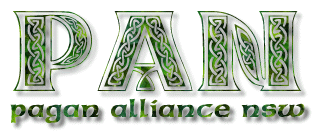|
Lughnasadh 1999 Newsletter About Lughnasadh |

|
Lughnasadh is celebrated in the Southern Hemisphere between the 31st January and the 2nd of February. In the Northern Hemisphere it is celebrated on August the 2nd. Some Australian traditions still celebrate the festivals according to the northern dates, and other change the festivals to fit in with our Australian conditions.
Lughnasadh is pronounced loo-nus-uh and is associated with the Irish God Lugh. Lugh is described as being either the King or the champion of the Irish Tuatha de Dannan. For a wonderful account of these people and the stories associated with them, it is well worth reading Early Irish Myths and Sagas (edited by Gantz), or for a modern translation of The Tain by Thomas Kinsella - this story contains many tales of the deeds of Cuhulain (the hound of Ulster).
In time gone, the King was the symbol of the fertile earth and the fertility of his nation. If the King was strong, the land too was strong. Each year the King would be ritually killed to ensure the survival of the land. The myth of the Dying and Rising God can be seen clearly in Egyptian and Celtic Myths. The King surrenders his life, so that the land may be born anew. This guarantees plentiful harvests and a prosperous year.
This festival is a harvest festival, where in days gone by people, and families would gather together to play games, race horses, and feast in celebration of the harvest. It was not until medieval times that Lughnasadh also became known as Lammas (meaning ‘loaf mass’). This came from the Christian tradition of offering bread made from harvest grains, to their god.
Traditional activities at this time of year include placing a selection of your harvest on your altar, or in your outdoor sacred space, as an offering of thanks. Think about what you have gathered in your life and place symbols of these also on your altar along side your plant harvests.
To celebrate the abundance of the earth, and to share it with others can be done by the organisation of a feast to celebrate the changing seasons. You can also share this sprit by donating some food to charity so that others can share in the abundance the Earth has to offer.
A traditional activity is also the weaving of corn dollies. The material for weaving these can be purchased from florists, or craft stores. This is a great activity to get the kids involved in, and your local library should have books on wheat and corn weaving in the folk art craft section.
Another way that has been suggested to me as a way of connecting with the arts and crafts of our ancestors, might be to visit a local craft show, or agricultural show. Have a look at what our county areas are producing. You may even be able to learn from the experts how to produce a particular type of craft item.
We will now notice the days getting shorter, as we witness the descent of the Sun into the underworld. Here it will wait to be reborn at the Winter Solstice. The days however still have plenty of heat in them. They warm the earth to sustain it through the long winter months.
Lughnasadh Dance
(re-written by Shining Lakes Grove)Pronunciation:
Eithne (ENNA), Kian (KEEN), Dechtire (JEH-chiray), Lugh (LOO),
Manannan (MON-uh-non), Lughnasadh (LOO-nah-sah)
Chorus:
At your festival sound the horn, calling the people again
Child of Barleycorn, newly summer-born
Ripening like the grain, oh, ripening like the grain
Verses:
Lugh the light of summer bright clothed all in gold
Eithne you his mother true let his tale be told
It was known that Balor's own grandchild would do him in
He vainly sought but all for naught, imprisoning his kin
Kian the brave and clever knave, disguised himself so well
It wasn't hard to fool the guards, and enter Eithne's cell
The two did swoon from morn till noon, she bore him babies three
Then Balor's rage flew in her cage and cast them in the sea
The first two babes went to their graves, beneath the stormy sea
But Manannan he took Lugh on, his foster son to be
Lugh grew tall from spring to fall and sought to take a wife
But Balor came and made his claim and vowed to take his life
The two did fight from morn 'till night and Lugh did strike him one
And Balor's eye flew in the sky and there became the sun
Dechtire flew away with Lugh upon her wedding morn
Together they lay for many a day and soon a child was born
The child grew tall from spring to fall, Setanta was his name
And then at length by honor's strength CuChulainn he became
![]()